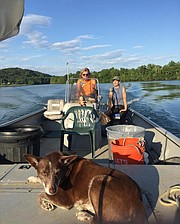Photo Gallery
Rollin' on the River: Artist heading down Tennessee River, documenting the lives of river people
Online
To see some of the photos on Wes Modes and his crew’s trip down the Tennessee River, go to flickr.com/photos/rthunder/sets/72157645247471388.
Life on America's vast rivers always fascinated Wes Modes.
As a youth, Mark Twain's Huck Finn and Tom Sawyer and Harland Hubbard's "Shantyboat Journal" filled him with a desire to experience and document life on the river.
"After that, I started reading river memoirs because I had been traveling on major rivers in homemade boats [and] rafts," says Modes, an art lecturer at the University of California at Santa Cruz and a summer curator at the Santa Cruz Museum of Art and History.
Modes' passion for this lifestyle and culture led him to create "A Secret History of American River People," an archival history of individuals whose lives are centered around rivers. He used Kickstarter to fund the first three segments of the project, raising almost $6,000. His ultimate goal is to create a massive research archive, as well as short and feature documentaries and a book series.
"The project is a multi-year, multi-river project to capture the stories of people who live and work on the river from a 1940s shantyboat," he says. "I have spent months on the river, talking to and interviewing people, gathering oral histories, and also just living the life of a river person.
"I wanted to do something that gave something back to the communities which I was visiting," says Modes. "So then I thought of this project."
In late June, in a boat he built with his crew and named Dotty after his grandmother, Modes, his dog Hazel and a member of his rotating crew set sail from Knoxville on the Tennessee River. They will drift down the entirety of the river over the course of summer, passing through Chattanooga, Huntsville and Florence, Ala., and ending in Paducah, Ky.
"For sure, we are experiencing the hazards of the river," says Modes. "We are waking up with the sun and going to sleep [when] the sun goes down and being rocked to sleep by waves.
"In terms of who I talk to, I'm interested in hearing the stories of people who have a lot of personal history in the communities and towns, people who had a role in shaping that town," says Modes. "I'm interested in people who lived their entire lives on the river. People who grew up playing around in boats on the river."
Most of the people he meets live on the shores of the river or inland, but he's also finding those who live in floating houses.
"I'm also interested in tracking down people whose voices aren't usually heard in conventional history," says Modes. "I sought out native people who are living by the river.
"Generally, I have two ways of meeting people: Either people I've heard about or who people havebeen referred me to upriver," he says. "But then we also run into people randomly."
As another goal of the project, Modes wants to include the stories of those who are often ignored, including those of women, Native Americans and other minorities.
In Iowa, he "came across a town that had a really large Latino population, which was really different for the Midwest, and I was able to talk to some folks about why is that," he says. "What's it like being in a little Iowa town as a Latino person?"
Another story he wants to tell is that of the huge roles rivers played, and still play, in some communities.
"I think that in our modern lives, it's possible to forget about the river," says Modes. "Historically, railroads and then later highways have displaced the river as the primary way that towns intersect with the rest of the world.
That was especially true in the development of Chattanooga, where the river was a highway of transportation for goods coming in and goods going out. The early growth of city's steel industry depended on the Tennessee River - and in many ways still does - to ship its products since the waterway often is more efficient than shipping by rail or trucks.
During the Civil War, Chattanooga was considered a critical city by both the Union and Confederate forces and one reason was the Tennessee River, which could ship supplies to either side.
"The river was your highway, your front door, your connection to the rest of the world," says Modes. "Everything around your town would be just be [untamed] wilderness."
While Modes finish the Tennessee River portion of the project this summer, he doesn't think he will ever quit telling the stories of river people.
"In terms of done, I don't know that I'll ever be done because there's plenty of rivers in America and lots of people who have lots of personal history," he says. "If I'm on the Tennessee River this year, I'll be on another river next year."

